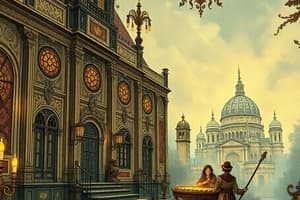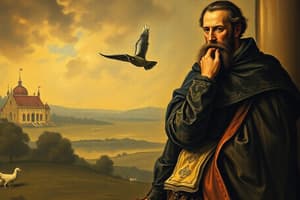Podcast
Questions and Answers
What significant historical period did the Enlightenment philosophers emerge from?
What significant historical period did the Enlightenment philosophers emerge from?
- Scientific Revolution (correct)
- Age of Exploration
- Renaissance
- Middle Ages
Which form of government was predominantly questioned by Enlightenment philosophers?
Which form of government was predominantly questioned by Enlightenment philosophers?
- Oligarchy
- Theocracy
- Monarchy (correct)
- Democracy
What was a key characteristic of thinkers from the Scientific Revolution?
What was a key characteristic of thinkers from the Scientific Revolution?
- Reliance on superstition
- Focus on religious teachings
- Emphasis on tradition
- Use of reason (correct)
What did Machiavelli emphasize in his work, The Prince?
What did Machiavelli emphasize in his work, The Prince?
What philosophical shift did the Enlightenment bring to political science?
What philosophical shift did the Enlightenment bring to political science?
Which of the following best describes the long-lasting dominance of monarchy?
Which of the following best describes the long-lasting dominance of monarchy?
What aspect of society did Enlightenment philosophers particularly challenge?
What aspect of society did Enlightenment philosophers particularly challenge?
Which historical period preceded the Enlightenment and laid the groundwork for its ideas?
Which historical period preceded the Enlightenment and laid the groundwork for its ideas?
What is the primary focus of Hobbes' argument in Leviathan regarding human life prior to government?
What is the primary focus of Hobbes' argument in Leviathan regarding human life prior to government?
What does Hobbes mean by the term 'state of nature'?
What does Hobbes mean by the term 'state of nature'?
How does Hobbes believe order is maintained in a state of nature?
How does Hobbes believe order is maintained in a state of nature?
According to Hobbes, how does the absence of government affect human progress?
According to Hobbes, how does the absence of government affect human progress?
Which of the following best describes Hobbes' view of leadership in a state of nature?
Which of the following best describes Hobbes' view of leadership in a state of nature?
What analogy does Hobbes use to explain life in a state of nature?
What analogy does Hobbes use to explain life in a state of nature?
What term does Hobbes use to refer to a powerful ruler capable of governing humanity?
What term does Hobbes use to refer to a powerful ruler capable of governing humanity?
What did Hobbes suggest people lacked in the state of nature?
What did Hobbes suggest people lacked in the state of nature?
How did Hobbes describe human life in the state of nature?
How did Hobbes describe human life in the state of nature?
What did Hobbes propose as a solution to escape the state of nature?
What did Hobbes propose as a solution to escape the state of nature?
According to Hobbes, what is a characteristic of the best leader?
According to Hobbes, what is a characteristic of the best leader?
What did Hobbes say about the people's rights under a ruler?
What did Hobbes say about the people's rights under a ruler?
What analogy does Hobbes use to illustrate his idea of leadership?
What analogy does Hobbes use to illustrate his idea of leadership?
What was Machiavelli's primary focus in his writings about leadership?
What was Machiavelli's primary focus in his writings about leadership?
What did Hobbes believe about the people's ability to resist their ruler?
What did Hobbes believe about the people's ability to resist their ruler?
How do Hobbes' ideas about rights compare to those of John Locke?
How do Hobbes' ideas about rights compare to those of John Locke?
According to Machiavelli, how do subjects typically react to a leader they fear?
According to Machiavelli, how do subjects typically react to a leader they fear?
What aspect of leadership does Hobbes think is vital for maintaining order?
What aspect of leadership does Hobbes think is vital for maintaining order?
What type of government did Machiavelli believe was most effective for maintaining power?
What type of government did Machiavelli believe was most effective for maintaining power?
What is a key difference between Machiavelli's ideas and those of other philosophers of his time?
What is a key difference between Machiavelli's ideas and those of other philosophers of his time?
What implication did Machiavelli's philosophy have for the subjects of a monarch?
What implication did Machiavelli's philosophy have for the subjects of a monarch?
What was a significant aspect of Machiavelli's argument regarding morality in leadership?
What was a significant aspect of Machiavelli's argument regarding morality in leadership?
What does Machiavelli suggest about the nature of leadership success?
What does Machiavelli suggest about the nature of leadership success?
What might be a consequence for citizens living under a Machiavellian ruler?
What might be a consequence for citizens living under a Machiavellian ruler?
What is the primary reason individuals agree to pay taxes?
What is the primary reason individuals agree to pay taxes?
What concept suggests that the government must follow laws as citizens do?
What concept suggests that the government must follow laws as citizens do?
Which of the following best defines the separation of powers?
Which of the following best defines the separation of powers?
What is an example of checks and balances in the U.S. government?
What is an example of checks and balances in the U.S. government?
What was Montesquieu's main argument regarding government power?
What was Montesquieu's main argument regarding government power?
Which Enlightenment thinker wrote about the peaceful state of nature?
Which Enlightenment thinker wrote about the peaceful state of nature?
How does the structure of government in the U.S. reflect Montesquieu's ideas?
How does the structure of government in the U.S. reflect Montesquieu's ideas?
What does the term 'aristocratic republic' imply in the context of limited government?
What does the term 'aristocratic republic' imply in the context of limited government?
Flashcards are hidden until you start studying
Study Notes
Enlightenment and Government Structure
- Enlightenment (1715-1789) influenced America's Founding Fathers, promoting questioning of monarchy as the dominant government.
- Philosophers sought to apply reason from the Scientific Revolution (1543-1688) to political science, moving away from superstition and tradition.
Renaissance Influence
- Renaissance (1300-1600) introduced new ideas shaping various fields, including governance.
- Niccolò Machiavelli, a pivotal thinker, authored The Prince (1513-1514), advocating for the use of fear to maintain power.
Machiavelli's Political Philosophy
- Machiavelli emphasized realism in leadership over moral ideals, stating leaders should gain and retain power, sometimes through fear.
- He argued that a powerful monarch is essential for effective governance to prevent conflict and maintain order.
Thomas Hobbes' State of Nature
- Hobbes’ Leviathan (1651) described a grim "state of nature" where life was chaotic and survival-focused, leading to fear and danger.
- He proposed a social contract theory where individuals surrender freedoms to a powerful sovereign for security and order.
Hobbes vs. Locke
- Hobbes believed that leaders could be tyrannical without resistance, as they provided protection from the state of nature.
- In contrast, John Locke’s Second Treatise of Government (1690) presents a more positive view of natural rights and government.
Montesquieu's Ideas
- Montesquieu's writings emphasized government limitations and the rule of law, ensuring leaders abide by laws.
- Advocated for separation of powers into legislative, executive, and judicial branches to prevent abuse of power.
- Checks and balances system established to maintain government equilibrium, allowing branches to limit each other's powers.
Rousseau's Perspective
- Jean-Jacques Rousseau, in Second Discourse (1755), posited that the state of nature was inherently peaceful, counter to Hobbes' view.
Studying That Suits You
Use AI to generate personalized quizzes and flashcards to suit your learning preferences.




